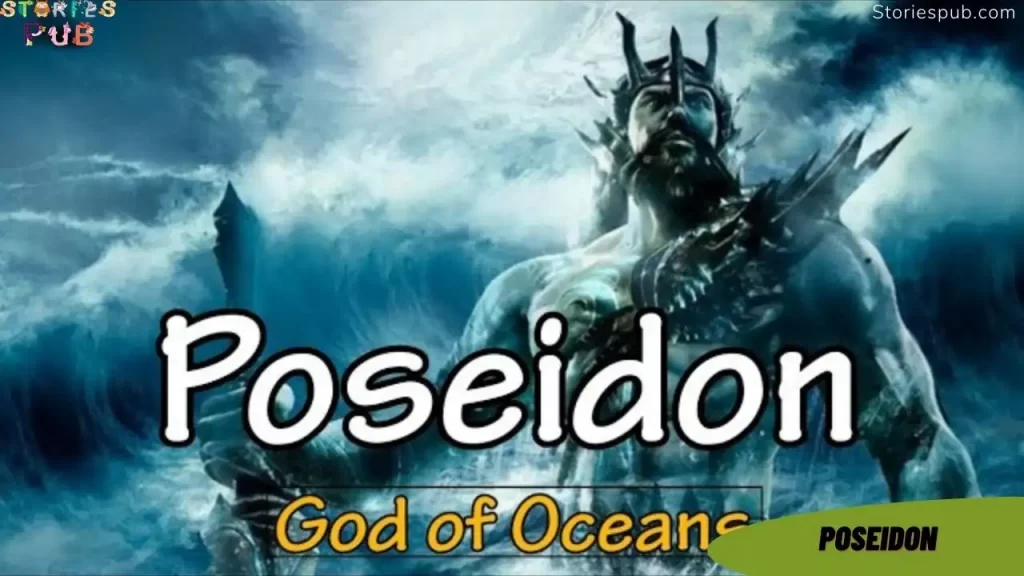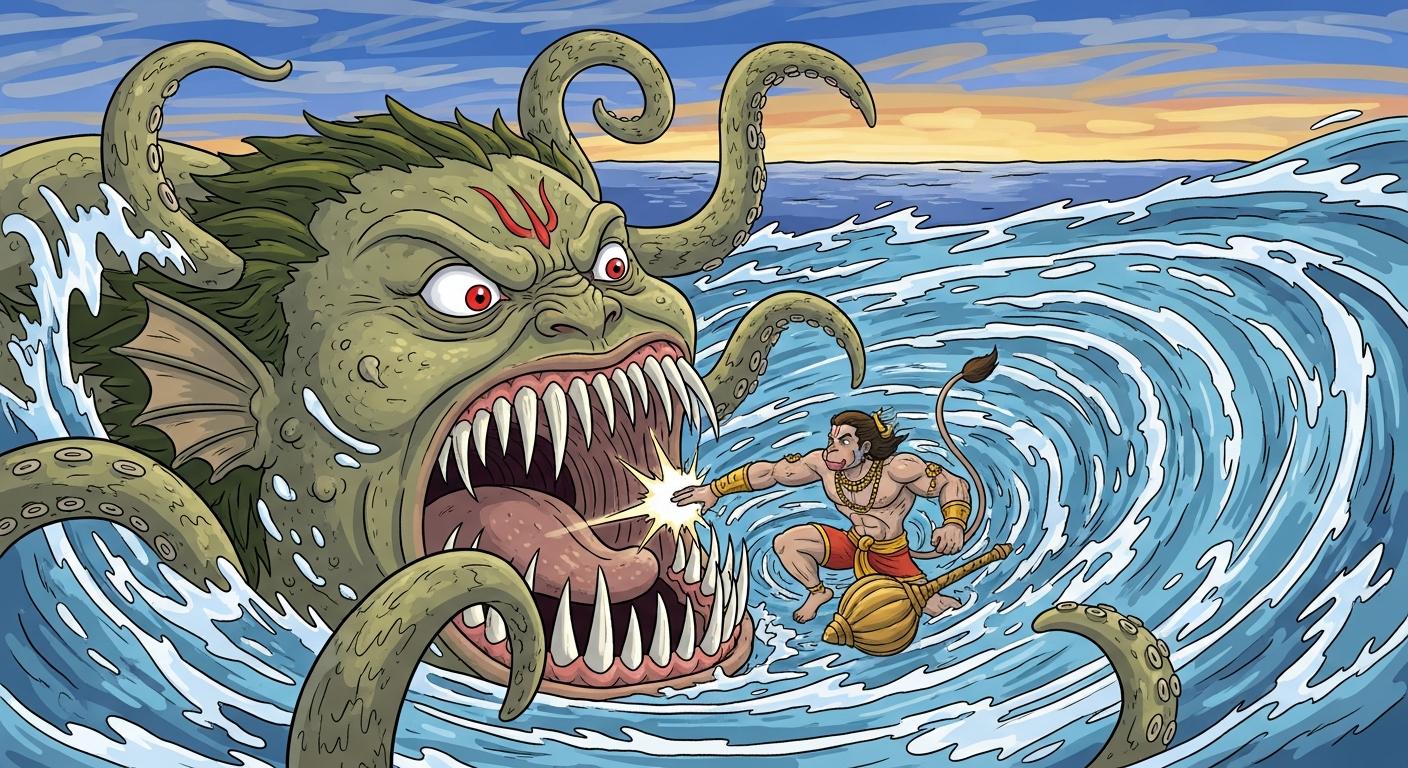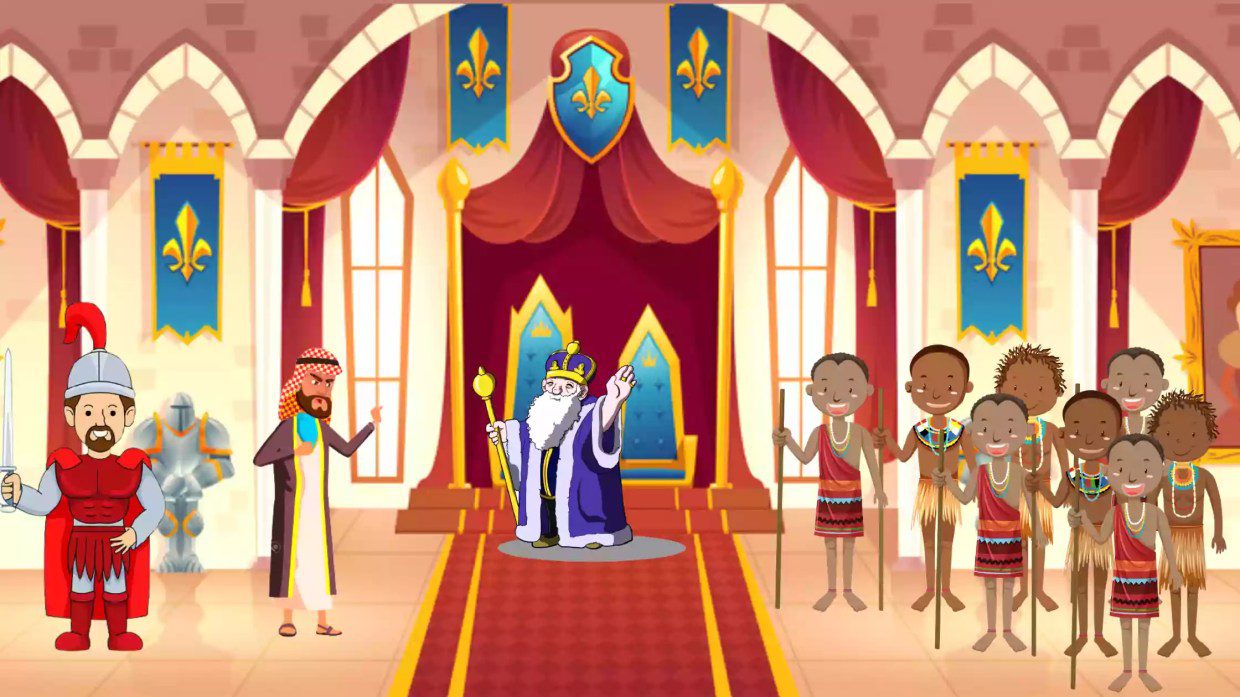Summarize this Article with:
The Mighty Poseidon: Mythology of the Greek God of the Sea

In Greek mythology, Poseidon is one of the most powerful gods and the ruler of the sea. Also known as the god of horses, earthquakes, and storms, Poseidon plays a significant role in many myths and legends. In this blog post, we will explore the mythology surrounding Poseidon, including his origin story, family relationships, powers, weaknesses, and notable myths involving him. We will also discuss his relationships with other gods and his symbolic significance in Greek mythology. Finally, we will delve into some of the lesser-known stories, including Poseidon’s relationship with Caeneus and Medusa. Join us on this journey through the fascinating world of Poseidon, the god of the sea.
Poseidon’s Meaning and Story
Poseidon is derived from the ancient Greek word “posis,” which means “lord” or “husband.” He was also known as the “Earth-Shaker” due to his power to create earthquakes and tsunamis. Poseidon was one of the twelve Olympian gods, along with Zeus, Hades, Hera, Demeter, and others. In Greek mythology, he was often depicted as a bearded man holding a trident, a three-pronged spear that was one of his primary symbols.
Poseidon’s Origin, Family Detail, and Birth
Poseidon was the son of Cronus and Rhea, and he had five siblings: Hestia, Demeter, Hera, Hades, and Zeus. After Cronus was overthrown by his son Zeus, the world was divided among the three brothers: Zeus became the god of the sky, Hades the god of the underworld, and Poseidon the god of the sea. Poseidon’s domain included all bodies of water, from the oceans to the rivers and even the underground springs.
You would also like to Read Tales of Ancient Greek Heroes
According to myth, Poseidon was born in a cave on Mount Olympus, alongside his siblings. Cronus often swallowed his children whole to keep them from taking over, but Rhea was able to trick him by hiding Poseidon and his siblings and putting a stone in their place.
Poseidon, the God of
Poseidon’s domain was the sea, but he was also associated with horses and earthquakes. As the god of the sea, he was responsible for all bodies of water, from the oceans to the rivers and even the underground springs. Sailors would pray to Poseidon for safe voyages and good weather. Poseidon was also the god of horses, and many mythological stories describe how he created these magnificent creatures, such as in the story of his rivalry with Athena. Finally, as the god of earthquakes, Poseidon was known for causing earthquakes and tsunamis.
Poseidon, God’s Roman Name
Poseidon’s Roman name is “Neptune.” In Roman mythology, Neptune was the god of the sea and the equivalent of Poseidon. The Romans adopted many of the Greek gods and goddesses into their own mythology, often giving them different names or interpretations. Neptune was a popular god in Roman culture, and many temples and monuments were dedicated to him.
Poseidon’s God Strengths and Weaknesses
Poseidon had many powerful abilities as a god. He was known for his control over the seas, being able to create storms, earthquakes, and tsunamis at will. He was also a shapeshifter, able to transform himself into various creatures, such as a bull or a horse. Poseidon was a skilled warrior, often depicted wielding his famous trident and leading his army of sea creatures into battle. However, Poseidon also had his weaknesses. He was often depicted as being impulsive and short-tempered, which could lead to disastrous consequences. Additionally, he was not invincible, and even his powers had their limits.
Poseidon’s wife and children
Poseidon had many romantic relationships in Greek mythology, but his most famous wife was Amphitrite, a sea goddess and one of the Nereids. Together they had many children, including Triton, a merman and messenger of the sea, and Rhode, a sea nymph. Poseidon also had many other children with mortal women, including Theseus and Polyphemus. While Poseidon was a powerful god, his personal life was often fraught with drama and conflict, with his many offspring often causing trouble for both mortals and other gods.
Poseidon’s Brothers and Sisters
Poseidon had several siblings. His brothers were Zeus, the king of the gods, and Hades, the ruler of the underworld. Poseidon’s sisters were Demeter, the goddess of the harvest, and Hestia, the goddess of the hearth. While Poseidon had many interactions with his siblings, his most notable conflicts were with Zeus, with whom he vied for power and control of the heavens and earth.
Poseidon’s weapon and its power
Poseidon’s iconic weapon was his trident, a three-pronged spear that symbolised his power and control over the sea. With his trident, Poseidon could create and control massive waves and storms, as well as cause earthquakes and other natural disasters. The trident was also a symbol of his authority as a god, and he often used it as a weapon in battles with other gods and monsters. However, the power of the trident was not limitless, and it could not be used to control or manipulate humans.
Poseidon as a god
In Greek mythology, the gods and goddesses were complex figures who embodied both positive and negative qualities. While Poseidon was known for his power and authority as the god of the sea, he was also sometimes portrayed as a violent and vengeful deity who was quick to anger. As such, it is difficult to say whether Poseidon is a “good” or “bad” god in the traditional sense.
You would also like to Read Medusa Story
One example of Poseidon’s more negative qualities is his treatment of mortals, particularly those who angered him or challenged his authority. In one famous myth, Poseidon punished King Minos of Crete by causing his wife to fall in love with a bull and giving birth to the monstrous Minotaur. In another story, he cursed the hero Odysseus with years of wandering and hardship after Odysseus blinded his son Polyphemus.
You would also like to Read List of Greek God
On the other hand, Poseidon was also revered for his power and his role in protecting sailors and seafarers. He was often called upon for help in dangerous situations, and he was believed to have the ability to calm storms and bring fair winds. Poseidon was also the god of horses, and he was often linked to birth and plenty.
You would also like to Read Zagreus Story
Overall, while Poseidon was certainly a powerful and important figure in Greek mythology, his reputation as a “good” or “bad” God is more complex and nuanced than a simple binary.
Other Gods vs. Poseidon
As one of the most powerful gods in the Greek pantheon, Poseidon was involved in numerous conflicts and rivalries with other deities. Some of the most notable include:
- Poseidon vs. Athena: According to one myth, Poseidon and Athena both wanted to be the patron gods of Athens. To determine who would win the honor, they competed in a contest to see who could offer the city the most valuable gift. Poseidon offered a spring of salty water, while Athena offered an olive tree. The people of Athens chose Athena’s gift, and she became the city’s patron goddess.
- Poseidon vs. Zeus: As two of the most powerful gods in the Greek pantheon, Poseidon and Zeus had a contentious relationship. In some stories, they worked together to defeat the Titans and establish their rule over the universe. However, they also had many conflicts, particularly over control of the heavens and earth.
- Poseidon vs. Apollo: In one myth, Poseidon and Apollo competed for the love of the same mortal woman, Cassandra. Apollo ultimately won her heart, and as punishment, Poseidon cursed Cassandra to always speak true prophecies that no one would believe.
- Poseidon vs. Polyphemus: In the story of Odysseus, Poseidon was angry with the hero for blinding his son Polyphemus, a cyclops. As a result, Poseidon cursed Odysseus with years of wandering and hardship.
Poseidon Characteristics:
Poseidon is often depicted as a tall and muscular man with a beard and long hair, holding a trident in his hand, which is his primary weapon. He is known for his powerful presence and is often associated with the sea, wearing a crown of seashells on his head. Poseidon’s personality can be described as unstable and unpredictable, and he is often shown to have a short fuse.
You would also like to Read Nyx Goddess
Despite his volatile nature, Poseidon is also known for his strong sense of justice, particularly when it comes to maritime issues. He is seen as the guardian of sailors and fishermen, and people who want to travel safely across the sea often pray to him.
Poseidon Myths:
Poseidon is featured prominently in many Greek myths, often as a key player in various power struggles among the gods. Some of the notable myths involving Poseidon include:
- The Contest for Athens: In this myth, Poseidon and Athena compete for control of the city of Athens. With his trident, Poseidon makes a saltwater spring, but Athena wins the contest by making an olive tree, which is more useful to the people of Athens.
- The Birth of Pegasus: Poseidon is the father of the winged horse Pegasus, who is born from the blood of the Gorgon Medusa after Perseus kills her. Poseidon has a small part in this myth, but the fact that he is Pegasus’s father is important.
- The Rape of Medusa: Poseidon rapes the beautiful Medusa in one of the most infamous stories involving the sea god. As punishment for being raped, Medusa is transformed into a monster with snakes for hair.
- The Trojan War: Poseidon is an important figure in the Trojan War, taking sides with the Greeks against the Trojans. He is particularly important in the story of the Trojan Horse, in which he helps the Greeks sneak their soldiers into Troy by creating a storm that destroys the Trojan fleet.
- The Creation of the Horse: According to Greek mythology, Poseidon created the first horse by striking a rock with his trident. The Greeks highly valued the horse, which quickly became a symbol of freedom and power.
Poseidon’s famous war
One of Poseidon’s most famous wars was the Trojan War, in which he sided with the Trojans against the Greeks. Myth says that the Greeks had hurt Poseidon’s honour by blinding Polyphemus, his cyclops son. This made Poseidon angry.
Poseidon played a significant role in the war, helping the Trojans by creating massive waves and sea monsters to attack the Greek ships. But in the end, his plans didn’t work, and the Greeks were able to beat the Trojans and take over the city of Troy.
You would also like to Read Pan God
In addition to the Trojan War, Poseidon was involved in other notable conflicts. For example, he fought against Athena over the city of Athens, and he battled Apollo over the control of Delphi.
Despite his involvement in many wars, Poseidon was not always a violent or aggressive deity. He was also revered as a god of fertility and was often associated with the growth and abundance of crops. Poseidon was also sometimes shown as a guardian of sailors and fishermen, and it was thought that he could calm the seas during storms.
Poseidon’s Portrayal and Symbolism
Poseidon has been depicted in art and literature for centuries, with different cultures and artists portraying him in their own unique ways. In Greek art, he was often shown as an old man with long hair and a beard who held his trident, a powerful weapon he used to control the seas and cause earthquakes.
You would also like to Read Hermes God Story
Symbolically, Poseidon represented the power of the sea, which was a significant force in Greek life and culture. He was considered the god of the oceans and was responsible for creating storms and waves, and he was often depicted as a violent and unpredictable deity. Poseidon was also linked to horses, which were an important part of ancient Greek life because they were used in war, for travel, and in farming.
Poseidon’s role in Greek mythology was significant, as he was one of the twelve Olympian gods who ruled over the universe from Mount Olympus. As the god of the sea, he was in charge of the safety of sailors, fishermen, and merchants. Seafarers often worshipped him as their patron god.
Poseidon’s role in defeating the Titans
Poseidon played a significant role in the battle between the Titans and the Olympian gods, which resulted in the defeat of the Titans and the establishment of the new gods’ rule over the universe. According to Greek mythology, Poseidon and his brothers, Zeus and Hades, fought against the Titans alongside other gods and goddesses, including Hera, Demeter, and Hestia. Poseidon played a big role in the battle because he used his powerful trident to make huge waves and control the sea. This made it harder for the Titans to defend themselves.
You would also like to Read List of Greek Goddesses
Poseidon’s efforts in the war against the Titans earned him a place among the most important gods in the Greek pantheon. He was known for his strength, determination, and unwavering loyalty to the Olympian cause. Despite his sometimes turbulent relationships with other gods, Poseidon was widely respected and revered for his role in the defeat of the Titans and the establishment of the new order.
Poseidon’s famous rivalry with Athena
Poseidon had a complicated relationship with his fellow Olympian gods, including a rivalry with Athena. In one famous myth, Poseidon and Athena both wanted to be the patron gods of the city of Athens. They competed to provide a gift that would impress the citizens of the city, and Poseidon offered a saltwater spring while Athena offered an olive tree. The citizens chose Athena’s gift, and she became the city’s patron goddess, causing Poseidon to become angry and curse the city with a drought.
Poseidon’s relationship with Demeter
Poseidon also had a relationship with Demeter, the goddess of agriculture. According to some myths, Poseidon pursued Demeter, who rejected his advances. In other myths, Poseidon and Demeter had a consensual relationship and even had a child together.
Poseidon was also involved in the Olympian murder trial, which took place after the god Dionysus was killed by the Titans. Some versions of the myth say that Poseidon was one of the gods who conspired to kill Dionysus, while others say that he was one of the gods who defended Zeus when he was accused of the murder.
Two notable stories involving Poseidon and the Olympian gods
“The Titan’s Curse” and “The Battle of the Labyrinth” are two notable stories involving Poseidon and the Olympian gods.
In “The Titan’s Curse,” the goddess Artemis is kidnapped by the Titan lord Atlas, and a group of demigods must embark on a quest to save her. Poseidon aids the group by lending them his hippocampi, magical sea creatures that help them travel across the ocean. The story also features a confrontation between Poseidon and his nephew, Ares, the god of war.
In “The Battle of the Labyrinth,” Poseidon helps the demigod Percy Jackson navigate through the treacherous labyrinth in order to prevent the evil Titan lord Kronos from rising again. Poseidon also helps in the final battle against Kronos, which helps the Olympian gods win and defeat the Titan.
Poseidon’s relationships with Caeneus and Medusa
Caeneus was originally a woman named Caenis, who was raped by Poseidon and then granted a wish to become invulnerable to physical harm. Caenis then became Caeneus, a male warrior, and joined the Lapiths in their battles. In one famous myth, Caeneus fought against the Centaurs, who were attacking the Lapiths. The Centaurs were unable to harm Caeneus, and in frustration, they buried him alive under a pile of trees.
As for Medusa, according to the myth, Poseidon raped her in the temple of Athena. Athena, angered by the desecration of her temple, transformed Medusa into a monster with snakes for hair and the ability to turn people to stone with her gaze. Perseus later beheaded Medusa and used her head as a weapon to defeat his enemies.
Overall, Poseidon’s relationships with Caeneus and Medusa were marked by violence and tragedy. While Caeneus was granted invincibility by Poseidon, he was ultimately killed by the Centaurs, and Medusa was transformed into a monster after being raped by Poseidon.
Poseidon’s significance in Greek mythology
Poseidon is one of the twelve Olympian gods in Greek mythology, and he is considered the god of the sea, horses, and earthquakes. He is often depicted as a bearded, muscular man wielding a trident and riding a chariot pulled by horses. Poseidon is known for his volatile personality and his propensity for causing storms and tempests when he is angry or displeased. Despite his reputation for being difficult to deal with, Poseidon was a major figure in Greek mythology, and his stories were often used to explain natural phenomena such as earthquakes, tsunamis, and the changing tides of the sea. His myths have also been the basis for a lot of art, literature, and pop culture over the years, which solidifies his place in the pantheon of the ancient gods.
Conclusion
Summary of the main points covered in the blog post, including Poseidon’s origin, family, role as a god, powers, weaknesses, relationships, and notable myths • Discussion of Poseidon’s significance in Greek mythology, including his role as one of the twelve Olympian gods and his symbolic significance Final thoughts on the enduring legacy of Poseidon in art, literature, and popular culture, and how his story continues to captivate people today.
Hey kids, how much did you like The Mighty Poseidon: Mythology of the Greek God of the Sea? Please share your view in the comment box. Also, please share this story with your friends on social media so they can also enjoy it, and for more such stories, please bookmark storiespub.com.
Check out other stories that we have:
- 1. Hindi Stories
- 2. Panchatantra stories
- 3. Moral Stories
- 4. Bed Time Stories
- 5. How to Draw
- 6. Scary stories for kids
- 7. Mythological Stories















